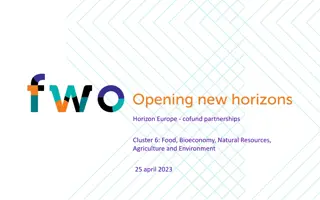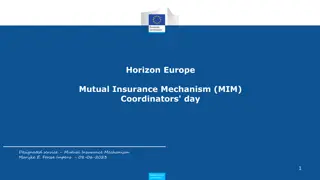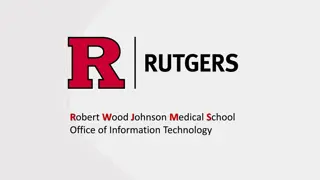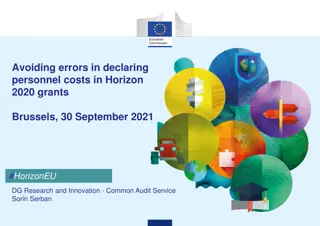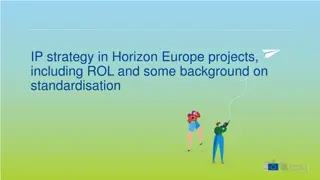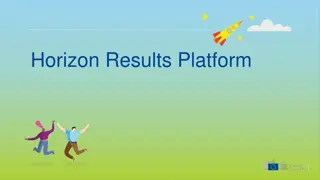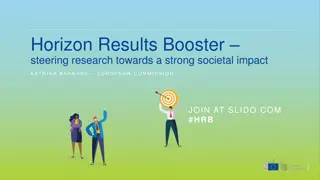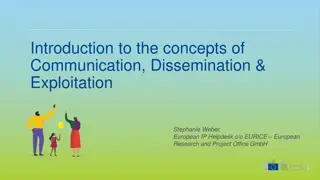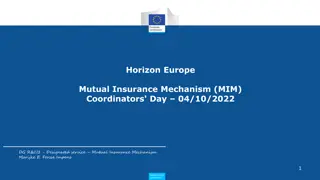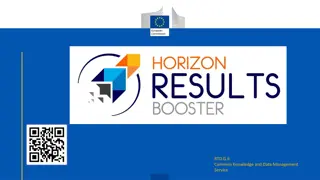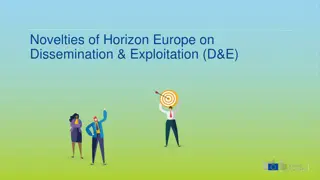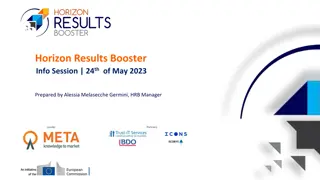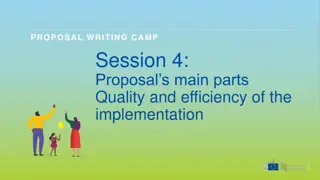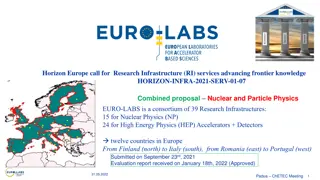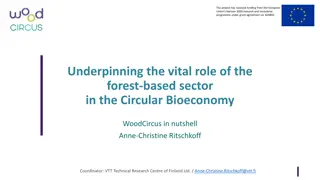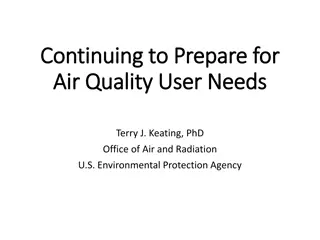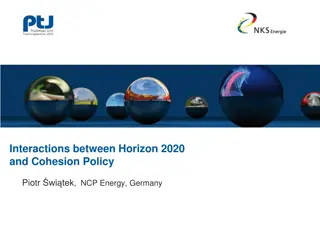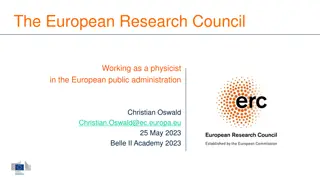Understanding Open Science Practices in Horizon Europe
Open Science in Horizon Europe emphasizes open, collaborative research processes to enhance excellence and impact. Important documents and resources provide guidance on meeting open science obligations, while proposals are evaluated based on open science practices. Evaluating proposals in Horizon Europe involves assessing the quality of implementation, expertise in open science, research data management, and the quality of open science practices.
Download Presentation

Please find below an Image/Link to download the presentation.
The content on the website is provided AS IS for your information and personal use only. It may not be sold, licensed, or shared on other websites without obtaining consent from the author. Download presentation by click this link. If you encounter any issues during the download, it is possible that the publisher has removed the file from their server.
E N D
Presentation Transcript
Open Science in Horizon Europe: a proposer s primer Victoria Tsoukala, PhD, Policy Officer Unit Open Science , DG RTD April 21, 2021
Open Science in Horizon Europe Open science means an approach to the scientific process based on open cooperative work, tools and diffusing knowledge (Horizon Europe Regulation and Model Grant Agreement) The concepts of Open Science, Open Innovation, Open to the World should ensure excellence and impact of the Union s investment in research and innovation, while safeguarding the Union s interests (Recital 7 Horizon Europe Regulation) The work programme may provide for additional incentives or obligations for the purpose of adhering to open science practices (Horizon Europe Regulation, article 39)
Important documents and resources Model grant agreement (MGA), article 17 lists the obligations you have, i.e. the requirements of the policy Work Programme General Annexes, evaluation criteria described; open science- a couple of additional obligations outlined there (access for validation and public emergency). Proposal template- shows where and how to address open science- definition of open science practices Annotated Grant Agreement (AGA), article 17- offers explanations and guidance for open science requirements Horizon Europe Programme Guide presents what is required at proposal stage and how open science is evaluated; open science practices analysed and resources provided-useful for proposers and evaluators
Open Science practices* early and open sharing of research (for example through preregistration, registered reports, pre-prints, or crowd-sourcing) research output management including research data management measures to ensure reproducibility of research outputs providing open access to research outputs (e.g. publications, data, software, models, algorithms, and workflows) through deposition in trusted repositories participation in open peer-review involving all relevant knowledge actors including citizens, civil society and end users in the co-creation of R&I agendas and contents (such as citizen science) *Listed in the proposal template ** Mandatory and non-mandatory practices. Mandatory in MGA and WP
Evaluation of proposals and Open Science Excellence criterion Quality of implementation criterion (methodology) (capacity of participants and consortium as a whole + list of achievements) Explain expertise on OS (if no OS practices are involved then no expertise required) Up to 1 page to describe OS practices + up to 1 page to describe research data/output management List publications, software, data, etc, relevant to the project with qualitative assessment and, where available, persistent identifiers Evaluation of the quality of open science practices Publications expected to be open access; datasets expected to be FAIR and as open as possible, as closed as necessary . Significance of publications to be evaluated on the basis of proposers qualitative assessment and not per Journal Impact Factor **evaluation concerns mandatory and non-mandatory practices, the latter where appropriate **exception: ERC does not evaluate open science
Model Grant Agreement requirements 1. Open access to scientific publications 2. Research Data Management 3. Additional open science practices
1. Open access to scientific publications I/II Beneficiaries must ensure OA to peer-reviewed scientific publications relating to their results. In particular, they must ensure: at the latest upon publication, deposition of the AAM or VoR in a trusted repository + immediate open access via the repository under CC BY or equivalent (CC BY-NC/CC BY-ND are allowed for long-text formats) information via the repository about any research output/tools/instruments needed to validate the conclusions of the scientific publication Metadata must be open under CC 0 or equivalent, in line with the FAIR principles and provide information about the licensing terms and persistent identifiers, amongst others. Trusted repository: new term for HE; explained in the AGA; seek assistance from your library to assess whether a repository is trusted
1. Open access to scientific publications II/II Beneficiaries (or authors) must retain sufficient intellectual property rights to comply with the OA requirements Publication in venue of choosing but publication fees are reimbursable only if publishing venue is full open access (publication fees in hybrids not reimbursed)
2. Research data management Beneficiaries must manage the digital research data generated in the action responsibly, in line with the FAIR principles and: establish + regularly update a data management plan ( DMP ) for generated (and/or collected) data; by mo 6 of project; with submission or latest by grant agreement in cases of public emergency (e.g. COVID projects) as soon as possible and within the deadlines set out in the DMP, deposit the data in a trusted repository (federated in the EOSC if required in the call conditions) +ensure OA under CC BY, CC 0 or equivalent, following the principle as open as possible as closed as necessary provide information via the repository about any research output/tools/instruments needed to re-use or validate the data Metadata must be open under CC 0 or equivalent (to the extent legitimate interests or constraints are safeguarded), in line with the FAIR principles and provide information about the licensing terms and persistent identifiers, amongst others.
3. Additional Open Science practices I/II Some calls may have additional obligations on OS practices- they must be complied with Beneficiaries must provide (digital or physical) access to data or other results needed for validation of the conclusions of scientific publications, provided legitimate interests safeguarded and unless (open) access already provided at publication (mainstreamed through general annexes of WP; does not currently apply to ERC) Additional obligations in cases of public emergency Next slide .
3. Additional Open Science practices- Public emergency II/II If imposed by the call conditions in case of a public emergency, beneficiaries must (if requested by the granting authority) immediately deposit any research output in a repository + provide open access to it under CC BY, CC 0 or equivalent. As an exception, if the access would be against the beneficiaries legitimate interests, beneficiaries must grant non-exclusive licenses under fair and reasonable conditions to legal entities that need the research output to address the public emergency + commit to rapidly and broadly exploit the resulting products and services at fair and reasonable conditions. This provision applies up to four years after the end of the action.
Open Research Europe: A high-quality, reliable and efficient open access publishing venue for EU- funded research Launched in March 2021 for H2020 and HE beneficiaries High scientificstandards (e.g. editorial policies+guidelines), expert Scientific Advisory Board across all fields of science Swiftpublication times and transparent processes (e.g. open peer-review) No cost to authors/beneficiaries (publication fees paid by the Commission) Optional: no obligation to publish there: but if you do, you comply with HE policy https://open-research-europe.ec.europa.eu/


